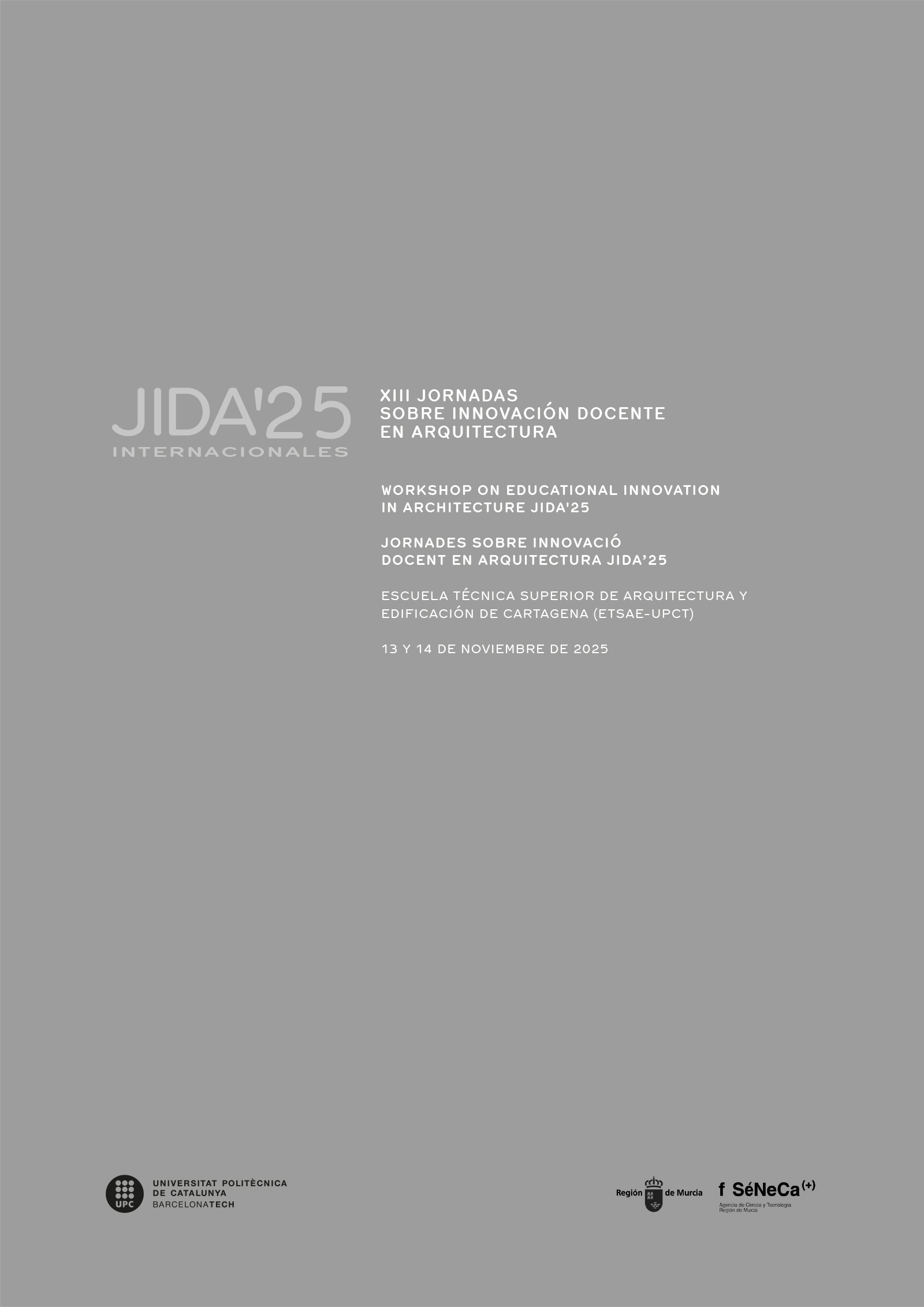Cosmologies of participatory design: PlaYInn summer course
DOI:
https://doi.org/10.5821/jida.2025.13684Keywords:
co-design, co-creation, youth, public squares, reuseAbstract
The text explores participatory design as a pedagogical and transformative tool, understanding each project as a cosmology of relationships and meanings. It describes a summer course framed within the PlaYInn project, where students from various disciplines collaborated in the co-creation of urban furniture using reused materials, applying Research by Design and Action-Research methodologies. The course combined lectures, collaborative design, and 1:1 scale construction, culminating in a public exhibition with a popular vote. The value of the prototype as an epistemological vehicle is highlighted, integrating theory, practice, and sustainability. The Design-Build approach allowed students to learn by doing, facing real technical and social challenges. Collaboration with collectives, companies and local institutions strengthened the link between academia and community. The project aligns with the principles of the New European Bauhaus, promoting beauty, sustainability, and participation in public space.
References
«Esta es una plaza. 2014. Dossier proyecto~ Esta es una plaza». Accedido 1 de septiembre de 2025, de https://estaesunaplaza.blogspot.com/p/dossier.html
Ayuntamiento de Logroño. «Logroño Calles Abiertas». Accedido 22 de mayo de 2025, de https://www.logronocallesabiertas.es/
Bauhaus-Universität Weimar. 2022. Build It Yourself (BIY): Democratically. Weimar: Bauhaus Summer School Workshop Report.
Braungart, Michael. y McDonough, William. 2002. Cradle to Cradle: Remaking the Way We Make Things. Nueva York: Farrar, Straus and Giroux.
Building Impact Zero Network (Bi0n). 2023. Workshop Design & Build: Mobiliario urbano circular con criterios de desmontaje. Barcelona: UPC School.
Cámara Menoyo, C. 2012. Las iniciativas de participación ciudadana en el urbanismo: el urbanismo participativo, una nueva forma de entender la ciudad y la ciudadanía en la configuración de espacios públicos. [Artículo, Universidad de Almería] URBS: Revista de estudios urbanos y ciencias sociales, Vol. 2, No. 1, pp. 19-32 https://dialnet.unirioja.es/servlet/articulo?codigo=5685575
Erasmus Intensive Program – Wood. 2014. Final Report: Workshop de Prototipado de Mobiliario en Madera. Helsinki: Aalto University School of Arts, Design and Architecture.
Espinosa, Enrique. 2024. Aprender, hacer y hackear juntas. Prácticas colaborativas menores desde la arquitectura en una cultura libre española 1996-2021. Tesis. Universidad de Alicante Repositorio institucional https://rua.ua.es/dspace/handle/10045/151557
European Association for Architectural Education (EAAE). 2012. Teaching and Experimenting with Architectural Design: Advances in Technology and Changes in Pedagogy. Leuven: EAAE.
García Vázquez, Carlos. 2002. «La pedagogía proyectual: talleres, workshops y nuevos entornos docentes» Arquitectura y Enseñanza. Madrid: Fundación COAM.
García-Escudero, Daniel y Berta Bardí-Milà. 2024. Research by Design. Barcelona: Palimpsesto, Universitat Politècnica de Catalunya. https://doi.org/10.5821/palimpsesto.27.13424
Grávalos, Ignacio y, Di Monte, Patricia. 2013. «Estonoesunsolar: el re-uso como clave para una regeneración urbana sostenible». En 4th European Conference on Energy Efficiency and Sustainability in Architecture and Planning: Donostia-San Sebastián coordinado por Rufino Javier Hernández Minguillón, Víctor Araújo Corral y Raffaelina Loi. Universidad del País Vasco, 113–122. Universidad del País Vasco. Servicio Editorial Argitalpen Zerbitzua http://addi.ehu.eus/handle/10810/15068
HUB-IN Project. 2023. Summer School Brașov: Urban Furniture Prototypes for Youth Engagement. Brașov: Municipality of Brașov / European Commission.
Institute for Advanced Architecture of Catalonia (IAAC). 2023. Global Summer School: Prototyping Responsive Urban Furniture. Barcelona: IAAC.
«la escuela crece» Accedido el 22 de junio de 2025. De https://recetasurbanas.net/proyecto/la-escuela-crece/
Martinez-Almoyna Gual, Carles. 2023. «Experiencing Service Learning in Design-Based Partnerships through Collective Practice» En XI Jornadas Sobre Innovación Docente En Arquitectura (JIDA'23). Barcelona: Universitat Politècnica de Catalunya. Iniciativa Digital Politècnica. 529–540. doi:10.5821/jida.2023.12280. http://hdl.handle.net/2117/396143.
Mcniff, Jean. y Whitehead, Jack. 2013. Action Research: Principles and Practice. London. Routledge. https://doi.org/10.4324/9780203112755
«Re-crea» web de Basurama. Accedido 1 de julio de 2025. De https://basurama.org/proyecto/re-crea/
Sanders, N. Elisabeth. B. N. y Pieter Jan Stappers, P. J. 2008. «Co-creation and the new landscapes of design». CoDesign, 4(1), 5–18. https://doi.org/10.1080/15710880701875068
Serrano-Lanzarote, Begoña, Joan Romero-Clausell, Alberto Rubio-Garrido e Isaac Villanova-Civera. 2023. «La experiencia de un taller “learning by building” en el diseño de un balcón de madera». En JIDA’23 – XI Jornadas sobre Innovación Docente en Arquitectura, 1–12.
Soriano Peláez, Federico, Silvia Colmenares Vilata, Eva Gil Lopesino y Eduardo Castillo Vinuesa. 2019. «Versiones Beta. El prototipado como herramienta de aprendizaje». En JIDA’19 VII Jornadas sobre Innovación Docente en Arquitectura Barcelona: Universitat Politècnica de Catalunya. Iniciativa Digital Politècnica 624–636. https://doi.org/10.5821/jida.2019.8368https://doi.org/10.5821/jida.2019.8368
Vear, Craig. (Ed.). 2021. The Routledge International Handbook of Practice-Based Research. Routledge.
Wigley, Mark. 1998. «The Bauhaus effect». Journal of Architectural Education. 51 (4): 207–215.






















